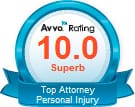Workers’ Compensation Basics
Workers’ compensation is a system that protects workers by paying them monetarily in the case of a job-related injury. Workers’ compensation provides a type of insurance that gives employers compensation for disabilities and injuries sustained as a result of their employment.
It is important to note that by accepting workers’ comp the employee is forfeiting their right to sue their employer. Each state outlines its own workers’ compensation policies, and the federal guidelines only apply to federal workers and their families.
Workers’ Compensation in Florida
Florida’s Workers’ Compensation law provides temporary disability benefits for workers who have missed 21 days from work due to their injuries. Temporary disability benefits are two-thirds of your income per week up to $971 and are adjusted annually. More severe injuries like paralysis, severed limbs, or blindness yield a higher benefits rate of 80% of the salary with no maximum amount.
Temporary Disability Benefits In Florida
Florida workers are entitled to temporary disability benefits until one of the following three events occur:
- Your doctor says you can return to work
- Your doctor feels that you’ve reached Maximum Medical Improvement and won’t improve any more from where you are
- You’ve reached the maximum amount of time for temporary disability benefits
The law originally stated that the limit for temporary disability benefits was two years, but the state supreme court found that to be unconstitutional if that individual is still recovering and hasn’t reached the maximum medical improvement. The statutes also establish provisions for returning to work with less income. 80% of the difference between 80% of your new and 80% of your old salary will be added to your current salary. It’s important to speak with an adept workers’ compensation lawyer in Florida to understand the intricacies of your compensation claim.
Permanent Impairment Benefits
Six weeks before your temporary benefits expire, or at the end of your medical treatment, your physician will evaluate you to determine if you have a permanent impairment because of your employment-related injury. If you’re able to return to work, then Florida law uses a rating assigned to your disability by your doctor to determine how long your employment benefits will last.
If you’re placed on permanent impairment benefits, then you are eligible to receive up to 75% of your temporary disability rate. If your doctor finds that you unable to return to employment because of your work-related injury, then you are eligible to receive 75% of your temporary disability rate for the rest of your life, 75 years old, or until you’re eligible for social security benefits.
Additional Florida Workers’ Comp Benefits
Florida’s Workers’ Compensation Law provides the following additional benefits in addition to temporary and permanent disability benefits:
- Medical Care: Employers and their insurance companies are responsible for all of the medical care necessary to treat employment-related illnesses and injuries. These costs can include travel costs to medical appointments and medicine prescriptions as well.
- Rehabilitation: Workers’ comp could pay for up to 52 weeks of vocational training if you need to find alternative employment solutions. These benefits may cover job placement services and vocational counseling. Speaking with an attorney with knowledge of the workers’ compensation laws in Florida could help you in receiving all of the benefits available to you in your case.
- Death: If an employee dies because of a work-related injury or illness, then the worker’s family is entitled to certain benefits. Depending on the number of dependants the spouse, children, and other dependents are entitled to up to two-thirds of the deceased worker’s income or $150,000 total. Workers’ compensation also covers some funeral and burial costs up to $7,500.
After the significant changes to workers’ compensation laws in 2003, many attorneys ceased that aspect of their practice. At The Lawrence Law Firm, we diligently and aggressively face the additional challenges to help secure the benefits that you deserve.
Our Workers’ Compensation Information Center provides additional details about the workers’ compensation system and contains answers to some frequently asked questions.
The Process And Challenges You Face
If you are out of work due to an injury, we will expedite the process to resolve your claim quickly, so you can begin collecting your workers’ compensation benefits and lost wages. Our lawyers will educate you about your rights and what to ask your doctor during your examinations.
Whether you are completely healed or have permanent work restrictions, your options will be to return to your old job, attend vocational training for a new career or settle the workers’ compensation matter and move on. If you choose to train for a different field, you can still collect your benefits. You have options after your injury, but understanding them can be overwhelming without the help of a knowledgeable attorney.
Retaliatory Practices
In some situations, an employer may fire an injured employee before the physician deems them healed of their injuries. Essentially, the employer is looking for a reason to dismiss the workers’ compensation claimant. That action can be construed as retaliation for filing a claim following an injury. At The Lawrence Law Firm, we can file suit against that employer for retaliation.
Challenges With Insurance Companies
Individuals who are injured on the job often face obstacles with the insurance companies regarding medical care for their injuries. The so-called “independent” physicians may not refer you to a specialist, even if you need one.
If the insurance company agrees to pay for a specialist, and that doctor recommends physical therapy, an MRI or surgery, the insurance company may delay paying for those treatment options. That is where an aggressive workers’ compensation attorney from The Lawrence Law Firm can help.
Frequently Asked Questions About Florida’s Workers’ Compensation
What are the limitations of Workers’ Compensation?
Workers’ comp benefits are normally tax-free but unfortunately, they only pay a part of your wages. Though the wages may come quicker because you don’t need to file a lawsuit, you do have to be out of work for 21 days before receiving any benefits.
Can I receive workers’ compensation benefits and file a lawsuit against my employer?
Generally receiving workers’ compensation benefits prevent you from bringing suit against your employer, but there have been some special cases that victims were allowed to do and receive damages. Consider if you’re injured because of a defective product, toxic substances, intentional misconduct, or if your employer doesn’t carry workers’ compensation insurance.
Is workers’ comp the same as unemployment or disability benefits?
No, they are not because workers’ compensation benefits are paid by your employer’s insurance company for your work-related injuries but unemployment and disability benefits are provided by the state and federal government.
Is workers’ compensation insurance mandatory for Florida businesses?
All businesses with more than four employees are mandated by the Florida law to provide workers’ compensation insurance to their employees. It doesn’t matter if these employees are full-time or part-time. Construction companies are responsible for providing insurance for all of their workers and contractors.
Can I receive workers’ compensation benefits while receiving other benefits?
You can receive workers’ compensation benefits and social security benefits at the same time as long as the total amount doesn’t exceed 80% of your pre-injury outcome. However, if you are receiving temporary total or permanent total workers’ comp benefits, then you are ineligible to receive re-employment assistance because of your inability to return to work.
Does my employer have to secure my position while I am on leave?
No, there are no laws that state that an employer has to hold your position until you are ready to return to work.
Can my employer fire me if I am injured on the job?
Your employer is unable to release you from your job if you’ve applied for unemployment benefits within thirty days of your injury.
What can I do if my employer denies my workers’ compensation claim?
The Florida Bureau of Employment Assistance can help you file a benefits petition if your claim is denied and can help you resolve your dispute at no cost to you. An attorney can provide detailed care to your case and help you evaluate if you can recover damages as a result of your work-related injury.
If your injuries keep you out of work for a year, you may be entitled to Social Security Disability.
For more information on your workers’ comp claim or to schedule an appointment, please contact us.







